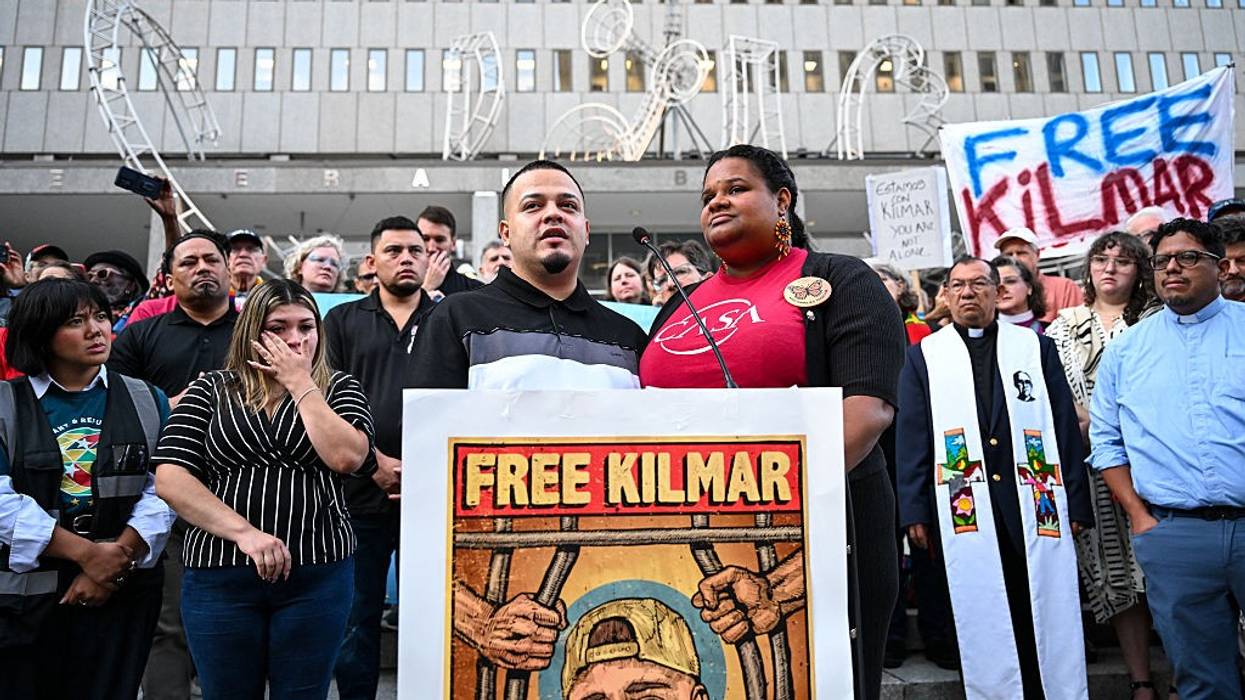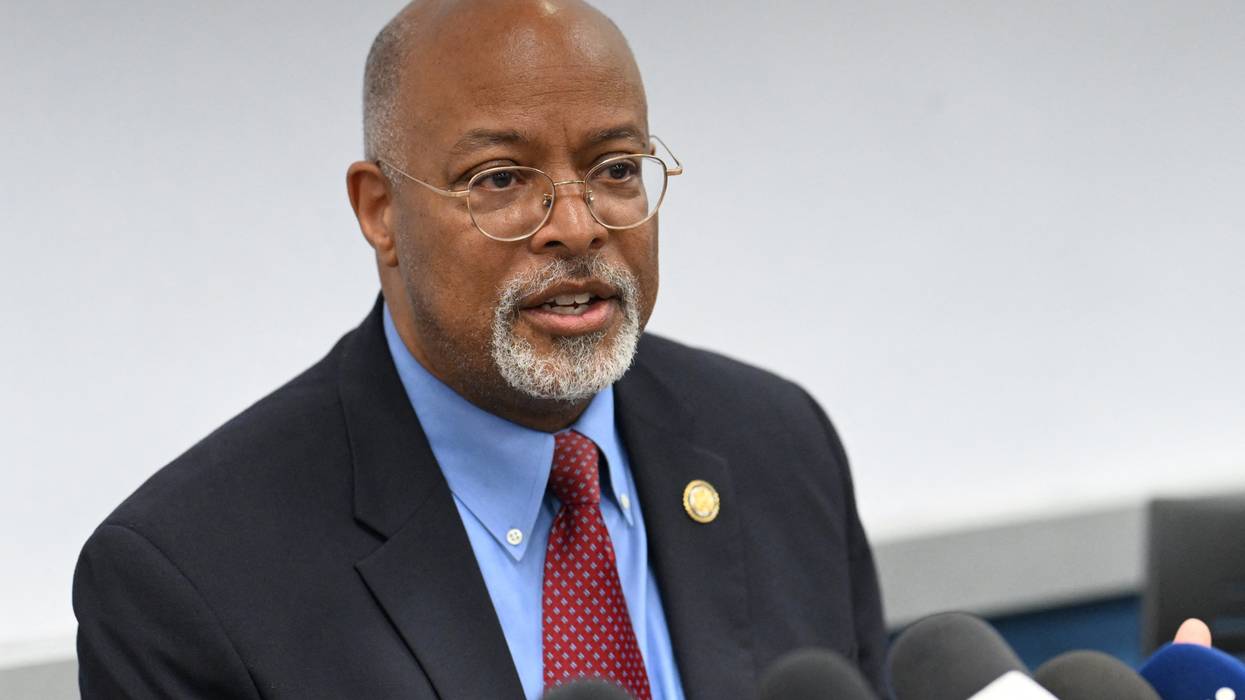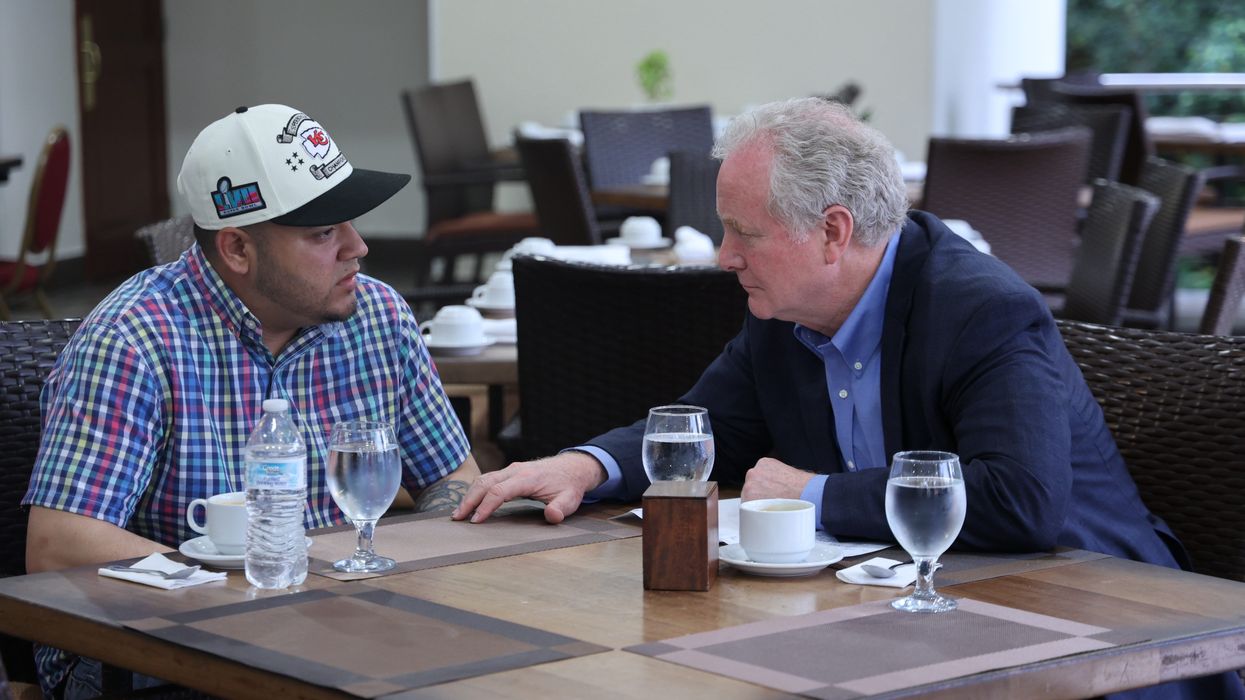'Malicious Abuse of Power': Trump Slammed for New Arrest of Ábrego García and Deportation Threat
"This vindictive behavior is not just about Mr. Ábrego García; this is once again the administration showing that it can weaponize the law to punish people standing up for their rights and make our immigrant neighbors afraid," said one advocate.
A crowd of community members who had gathered outside an immigration office in Baltimore on Monday chanted, "Shame!" as a lawyer for US resident Kilmar Ábrego García announced that he had been detained by Immigration and Customs Enforcement agents once again—days after he was finally released from prison after a monthslong ordeal.
Attorney Simon Sandoval-Moshenberg told the crowd that assembled to show support for Ábrego García that ICE had ordered the Maryand father and sheet metal worker to report to its offices for an interview on "false" pretenses and said his legal team is filing a habeas corpus petition to challenge the administration's plan to deport Ábrego García to Uganda.
Ábrego García's lawyers are arguing in the Federal District Court of Maryland that ICE re-arrested him without allowing him to express "fears of persecution and torture in that country."
The team is asking the court to ensure that Ábrego García "is not put on any flight to any country whatsoever, whether it's Uganda, South Sudan, what have you, unless and until he has had a full and fair trial in an immigration court as well as his full appeal rights," said Sandoval-Moshenberg.
It’s not clear what charges Abrego Garcia is facing, Simon Sandoval-Moshenberg says, or where he will be detained.
Sandoval-Moshenberg says another federal lawsuit is being filed to challenge the planned deportation to Uganda, of any other third-country. pic.twitter.com/9YYKd0hOfG
— Mikenzie Frost (@MikenzieFrost) August 25, 2025
As Common Dreams reported, when Ábrego García was released from a jail Friday in Tennessee—where he'd been held on human smuggling charges since being returned to the US in June following his mistaken deportation to El Salvador—the administration informed his legal team that it may deport him once again to Uganda.
That threat was made when Ábrego García declined an offer to be sent to Costa Rica as part of a plea deal in which he would be required to plead guilty to human smuggling.
Another lawyer for Ábrego García, Sean Hecker, said Monday that "the government's campaign of retribution continues because Mr. Abrego refuses to be coerced into pleading guilty to a case that should never have been brought."
Ábrego García's ordeal has been at the center of outrage over the Trump administration's mass deportation agenda and President Donald Trump's $6 million deal with Salvadoran President Nayib Bukele, under which hundreds of migrants have been deported to El Salvador's notorious Terrorism Confinement Center (CECOT).
Ábrego García was initially sent to CECOT in March, and US Department of Justice officials acknowledged that his deportation had been the result of an administrative error. He was accused of being a member of the gang MS-13 based on a statement from an anonymous police informant, and a judge ruled in 2019 that he could not be deported to his home country of El Salvador due to concerns over torture and persecution there.
Homeland Security Secretary Kristi Noem on Monday said Ábrego García was being processed for his new deportation order, but did not say where the administration plans to send him. She repeated the Trump administration's unproven claims about the Maryland resident, calling him "an MS-13 gang member, human trafficker, serial domestic abuser, and child predator" and said he would not "terrorize American citizens any longer."
Sen. Chris Van Hollen (D-Md.), who visited Ábrego García when he was imprisoned in El Salvador and demanded his release, condemned Noem for continuing to "spread lies about his case."
"Instead of spewing unproven allegations on social media, [officials] need to put up or shut up in court," said Van Hollen.
"The federal courts and public outcry forced the administration to bring Ábrego García back to Maryland, but Trump's cronies continue to lie about the facts in his case and they are engaged in a malicious abuse of power as they threaten to deport him to Uganda—to block his chance to defend himself against the new charges they brought," Van Hollen said. "As I told Kilmar and his wife Jennifer, we will stay in this fight for justice and due process because if his rights are denied, the rights of everyone else are put at risk."
Sarah Mehta, deputy director of policy and government affairs at the ACLU, said Ábrego García's arrest on Monday put "the Trump administration's obsessive and petty cruelty... on full display" and condemned the "latest move to deport Kilmar Ábrego García, a Maryland father they admitted to wrongfully deporting to a torture prison, to a country with which he has no relationship."
"This vindictive behavior is not just about Mr. Ábrego García; this is once again the administration showing that it can weaponize the law to punish people standing up for their rights and make our immigrant neighbors afraid of being rapidly exiled, including to places where they may be persecuted," said Mehta.
The Times reported Monday that Ábrego García "expressed willingness to leave the United States to accept refugee status in Costa Rica" after initially rejecting the plea deal.
An order handed down by the chief federal judge in Maryland in May requires the government to give Ábrego García a two-day reprieve before being expelled from the country following the filing of the habeas corpus petition.
Aaron Reichlin-Melnick, senior fellow at the American Immigration Council, suggested the administration has continued targeting Ábrego García simply because he and his legal team brought nationwide attention to the fact that officials had wrongly deported him and other migrants.
"The entire weight of the federal government has been brought against this man for one reason, and one reason alone," said Reichlin-Melnick. "He tried to get them to fix a mistake they admit they made."
Ábrego García acknowledged other families that have been impacted and separated by Trump's mass deportation policy before entering the ICE facility on Monday.
"To all of the families who have also suffered separations or who live under the constant threat of being separated," he said, "I want to tell you that even though this injustice is hurting us hard, we must not lose hope."



